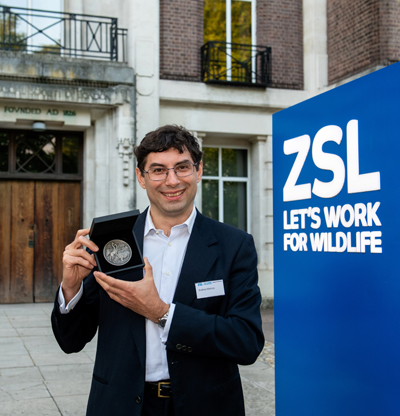Submitted by Administrator on Tue, 12/06/2018 - 13:36
 The Department offers its congratulations to Dr Andrea Manica on the award of the Zoological Society of London’s Scientific Medal, given to those with less than 15 years postdoctoral experience, for distinguished work in Zoology.
The Department offers its congratulations to Dr Andrea Manica on the award of the Zoological Society of London’s Scientific Medal, given to those with less than 15 years postdoctoral experience, for distinguished work in Zoology.
Andrea started life in the department as a Part II Zoology student. He graduated in 1997 with the Department’s Frank Smart prize for best undergraduate performance that year. He then went on to complete his PhD with Tim Clutton-Brock and collected another prize: the ZSL’s Thomas Henry Huxley and Marsh prize. After his PhD he took up a Junior Research Fellowship at Clare College before re-joining the Department as a lecturer in 2005. Just three years later, he won the Philip Leverhulme Prize in Zoology.
Andrea now has a large, successful research group (the Evolutionary Ecology Group), authored over 150 peer-reviewed papers, and been successful in attracting substantial grant awards. This has led to him achieving an international reputation in his field of evolutionary ecology and population biology.
He has built an international reputation based on his research into understanding patterns of individual movement, with an emphasis on disentangling its proximate mechanisms (e.g. grouping behaviour, territoriality, migratory behaviour, etc.) and its ultimate causes (e.g. fitness benefits, selection in metapopulations).
This has also led him into pioneering work understanding the role of population structure when reconstructing past demography and selection in a number of species. The importance of population structure is increasingly recognised and tractable and Andrea has been instrumental in demonstrating the importance of incorporating such structure into analyses.
Andrea is a pro-active and effective collaborator working closely with people from a wide range of fields including behavioural ecologists, population geneticists and anthropologists. By doing this, he is able to integrate evidence from a range of sources and sciences using for example paleoclimatic data and the palaeontology together with models of population genetics to improve our knowledge of the past.
Andrea has gone from strength to strength over the last 20 years or so and this award is well-deserved recognition of his work.
